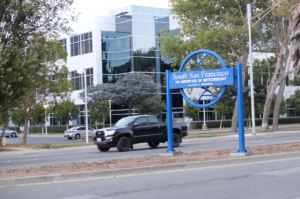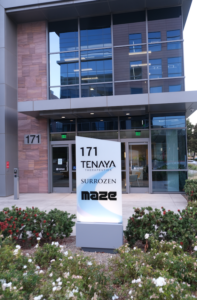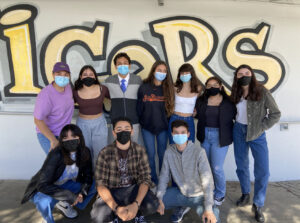In early 2020, the face of the biotech industry rapidly changed. Creating treatments to COVID-19 became a massively lucrative market almost overnight, and a myriad of biotech companies — the for-profit corporations which innovate treatments for a range of diseases — swiftly pivoted their research agendas to study a disease which was virtually unknown to the human immune system.
“In the beginning, when we didn’t know much about COVID, it was all hands on deck,” said Linda Fitzpatrick, Chief People and Communications Officer at Sutro Biopharma, a biotech company in South San Francisco. This sentiment was echoed across the entire industry. “Every research institution and organization that could have been helpful, I believe, really did try to be helpful,” said Fitzpatrick.
Biotech companies often studied COVID-19 through the lens of their own therapies and respective market niches. In this way, biotech companies could leverage their knowledge surrounding their current platform to study a novel disease, COVID-19.
For example, Tenaya Therapeutics, also located in South San Francisco, is a biotech company with a focus on treating heart disease — not necessarily equipped to study a respiratory virus.
There is, however, “evidence that [COVID-19] affects the heart,” according to Dr. Tim Hoey, Chief Scientific Officer at Tenaya.
COVID-19’s potential relation to heart disease was reason enough for Tenaya to begin research on the coronavirus — even though its disease profile does not align with the company’s primary sphere of research.
Sutro’s COVID-19 research was also informed by the company’s main approach to other diseases.
According to Fitzpatrick, studying the coronavirus was “a little outside our scope of research. [Sutro is] pretty much exclusively focused on oncology [treatment of cancer] and auto-immune diseases, so not necessarily a virus company in any respect.”
Despite the misalignment COVID-19’s viral nature and Sutro’s research focus, Sutro studied the coronavirus with Cell-Free, its proprietary technology. The technology is a way to rapidly produce therapeutics and assess biological activity without using live cells.

photo by Ethan Rendon
Sutro was approached by three research groups — both in the U.S. and abroad — to aid in their efforts to study COVID-19. Sutro’s Cell-Free technology helped those groups quickly assess biological activity related to COVID-19. Fitzpatrick said, “[Sutro provided] some thought and some technology relative to what we do with our Cell-Free platform to help those three groups further their COVID research.”
Once biotech companies began researching COVID-19 — often through their established platform and technology — they found a host of challenges along with researching the coronavirus.
Many biotech companies did not have access to the necessary safety gear and PPE for managing a lethally infectious respiratory pathogen. This meant they were ill-equipped to handle SARS-CoV-2, the virus which causes the COVID-19 disease.
According to Hoey, “[Tenaya doesn’t] have the right kind of facilities for working with infectious virus.”
In biotech, infrastructure is often a bottleneck for research; if a company lacks the materials or instruments to study a disease, that research is immediately off the table. Studying SARS-CoV-2 is no different. COVID-19 research demands a high level of biological safety so that scientists are not put in danger.
Still, small biotech companies — those unfit to study the coronavirus — conducted research anyway. Rather than working with a whole, live virus, biotech companies broke-up the SARS-CoV-2 virus into its individual parts — its proteins — which carry no threat of infectivity on their own.
According to Hoey, Tenaya only worked with the coronavirus “one protein at a time, because [one protein] is not going to make you sick. It’s not infectious by itself.”
Non-viral biotech companies were able to conduct research after all.
A second problem hindered the industry’s rapid pivot to studying COVID-19. Actually getting in to the lab to conduct the research proved to be another, greater obstacle.
Delays in shipment, shortages in personnel, and mandatory social distancing guidelines — restrictions which plagued virtually every industry during the onset of the COVID-19 pandemic — hit the biotech industry universally. Research, the backbone of biotech, must be conducted on-site and in labs.
Working from home simply is not conducive to scientific progress.
Biotech companies needed to continue to innovate treatments to diseases and help their patients; but, they also needed to ensure that their scientists — those who actually did the innovating — remained healthy as well.
Most biotech companies staggered the schedules of their scientists so that research could be conducted while not putting anyone in harm’s way. In this manner, biotech companies could continue studying diseases and creating treatments for their clinical patients — COVID-19 related or otherwise — during the pandemic lockdowns.
Hoey said, “in March, April, and May of 2020, [Tenaya] had to restrict the number of people coming into the labs at any one time… [Tenaya] had to use the early morning times, late times, and evening times to not have too many people there at once.”
“[Sutro] didn’t ever have a situation where everyone was sheltering-in-place,” said Fitzpatrick. “We didn’t have that luxury of choice. We had to continue to meet the demand for clinical supply.”
Employees at Sutro felt a moral duty to keep working. “We had an obligation to our patients to continue to produce medicine so that their clinical studies could continue,” said Fitzpatrick.
Despite the modified schedules, biotech companies still experienced delays. Reducing the number of people — and, therefore, the number of experiments — affected the timeline of completing research.
With fewer scientists in the lab and less working time to complete experiments, biotech companies had to prioritize their most important research agendas. Thus, they discontinued their low-priority experiments — those of which were unrelated to COVID-19 or to the company’s main pipeline of drugs.
According to Fitzpatrick, Sutro’s decision to pivot to study COVID-19, adding another research experiment to the docket, “did put a pause on a couple of lower priority programs, just because [Sutro is] still a fairly nascent, small company.”
Similarly, Tenaya focused on their most relevant research projects.
“We tried to prioritize experiments and only “We tried to prioritize experiments and only do the most important ones,” said Hoey, referring to Tenaya’s approach to research during shelter-in-place. “In particular, we tried to keep the in vivo experiments [that test drugs on whole, live organisms] going with the animals.”
The final and most daunting challenge facing biotech companies at the onset of the COVID-19 pandemic was delays in getting laboratory materials on-site. This challenge — issues in what scientists call the supply chain — had no clever solution.
When biotech companies were ill-equipped to deal with a live respiratory virus, they could break up SARS-CoV-2 into individual, harmless proteins. And, when biotech companies were forced to shelter-in-place due to COVID-19 related restrictions, they could utilize off-hours to always have small numbers of scientists in the lab.
But, issues in the supply chain — getting sensitive, biological-grade materials shipped from manufacturing plants across the world to labs in the U.S. — were not easily solved. Every step of scientific research demands high-quality, sterile materials; without access to biological-grade supplies, conducting research is impossible.
The supply chain issues had to be endured.
The unavailability of biological-grade products hit small biotech companies the hardest, especially for materials which Big Pharma also needed for experiments related to COVID-19.

photo by Ethan Rendon
Sutro needed a specific type of filter for manufacturing their Cell-Free platform, Sutro’s proprietary technology.
According to Fitzpatrick, “that filter is one of the same kinds of filters used in [COVID-19] vaccine production. And we honestly — simply — cannot get those filters. That continues to be a very, very big challenge.”
Big Pharma giants had greater access to the limited supply of biological materials, allowing them to continue their experiments. Small biotech companies were left fighting for the scraps.
“That supply chain,” Fitzpatrick said, referring to biological supplies going directly to Big Pharma, “really is a bottleneck for virtually every [small] biotech and pharmaceutical company.”
Hoey faced a similar problem at Tenaya. “There’s a kind of tissue culture disk that we use for growing large amounts of cells,” he said. “It’s called a hyperflask. And for a long time we couldn’t buy enough hyperflasks.”

Demand across the industry was high for hyperflasks, so they were in short supply. Because of this shortage, Tenaya had to delay certain experiments.
One of the largest hurdles in the supply chain was getting animals for in vivo experiments that tested drugs in live organisms, like mice or pigs. Particularly, Hoey said, “There’s a worldwide shortage of monkeys for doing research.”
Tenaya uses monkeys for safety studies, which are types of experiments conducted to ensure the safety of drugs before they are tested in humans.
Monkeys are especially useful for these experiments because of their evolutionary proximity to humans. But, monkeys for conducting research are often shipped from China and other countries in Asia, countries which experienced full-scale lockdowns at the beginning of the COVID-19 pandemic.
This made it virtually impossible to get monkeys to labs in the U.S.
And, like every disruption to the supply chain, this shortage in monkeys meant that biotech companies had to slow their timeline of research, limiting progress to their patients in clinical studies.
Getting biological-grade materials in the lab is a challenge which remains unsolved to this day.
But, the COVID-19 pandemic has brought some positives to biotech, hidden in-between the shortages in personnel and the acute supply chain delays which disrupted the entire industry. The COVID-19 pandemic brought recognition to biotech — a recognition for the important role that these companies play in upholding communities’ health and lives.
This spike of interest has been fueled by the incredible, rapid progress biotech has made in creating effective COVID-19 vaccines.
Referring to the roll-out of COVID-19 vaccines, Fitzpatrick said, “I think there is a lot of pride that the [biotech] industry, in general, felt with the success.”
Hoey shares this positive sentiment, extending it to the general public’s perception of biotech. “The silver lining in [the pandemic],” he said, “is that I think people appreciate the importance, now, of biomedical research.”
Fitzpatrick hopes that this pride will inspire our youth to take-up biology once they have seen its importance in slowing the COVID-19 pandemic.
She said, “I hope that there are budding young scientists in elementary and middle school who look at [the pandemic] and say, ‘Wow, what an opportunity to truly make a global difference if I go into science!’”






